Global resistance to referee abuse: The Referee Forum (U.K.)
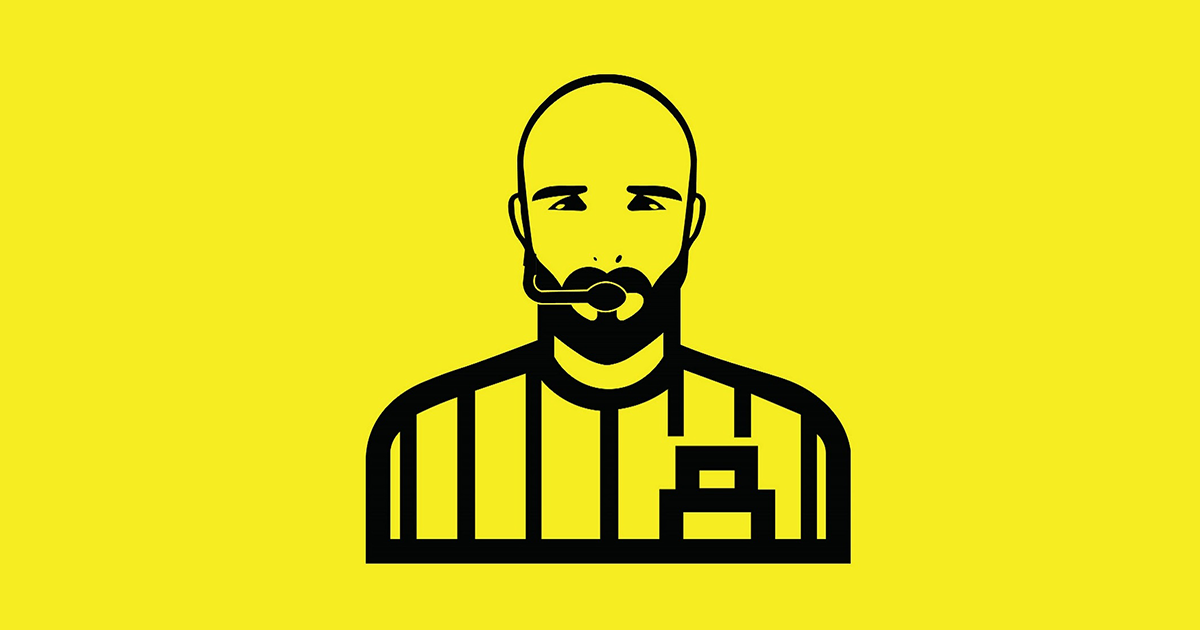
The unchecked behaviour of players, coaches and spectators towards referees creates an unsafe environment and reduces the enjoyment of everyone involved. Advocates for the respect of referees can be found all around the world.
Ant Canavan is one of them. He runs The Referee Forum out of the United Kingdom. He has thick skin (as we’ll hear/read below) and he knows that all referees are in the firing line, with now here near the support required to stop the abuse.
Thanks to Patrick Skene (who has written in-depth on the impact of referee abuse across various sports in Australia) you can listen to the full interview and read along with the transcript below.
Interview: Patrick Skene chats with Ant Canavan
Contents
-
- A depressing societal shift [0:00]
- Football’s biggest issue [1:28]
- Why the unprecedented levels of aggression towards Referees? [4:58]
- Why do we allow it? [7:21]
- What happens when a sport allows mobbing of officials? [9:53]
- Is abuse a part of the role? [13:13]
- The devastating impact of TV commentary on normalising referee abuse [16:34]
- Child referee abuse [21:11]
- Referee mental health [28:08]
- Social media abuse [29:55]
- Should police be involved in policing abuse in football matches? [35:56]
- What works to combat referee abuse? [39:10]
- #RefPositivity [42:34]
- How to find Ant Canavan and The Referee Forum? [44:51]
Transcript
1. A depressing societal shift [0:00]
Patrick Skene
Our guest tonight is the man behind ‘The Referee Forum’, the internet’s biggest and best independent resource for referees. He’s an ordained minister and his website’s hashtags #AbuseUsLoseUs and #NoRefLeftBehind sum up his muscular global advocacy for match officials, which includes challenging online trolls. It’s great to catch up with Ant Canavan who joins us from England. Hello, Ant
Ant Canavan
Hi Pat – thanks for having me. Pleasure to be here.
Patrick Skene
Well, I’ve just read through the last three months of your Twitter feed as penance for this interview, and it almost ruined my night. The level of abuse is really unbelievable, isn’t it?
Ant Canavan
It’s depressing really, especially when refereeing at grassroots level is a hobby and hobbies are meant to give people pleasure, and for the most part, it did up until the last few years.
There’s been some sort of cultural or societal shift where everyone has absolutely no problem with just tearing into the referee, regardless of who that referee is. Whether it’s a good performance or bad performance, the most important thing for the people that are tearing into referees is that their team wins and that team could be a bunch of eight-year-olds playing on the park for the very first time. It’s a depressing place to be on the centre of the park at the moment.
2. Football’s biggest issue [1:28]
Patrick Skene
How can anybody say that it’s not a red alert emergency crisis? With referee abuse and sometimes thuggery from top to bottom in English football that’s led to a combination of; all time high referee abuse, a shortage of officials down anywhere from 15 to 40% depending on the league, 1000s of referees leaving football, no new referees being trained. It sounds to me like the perfect storm for disaster. Is this the sport’s biggest issue?
Ant Canavan
You’d have to say yes, and here’s why. The top referees that we’ve got at the moment, they’ve come through a system where they received a good amount of support to get to where they are with the initial phase where they qualified and then they’ve stepped up and they’ve gone through the leagues. They did this in the 80s the 90s and the early noughties, there was a lot more respect for referees at that time.
And I just fear that in 10 years’ time, the quality of the top referees in England won’t be the same as it is now because there’s a filter being put on grassroots referees that are coming through now that would previously made the top echelons of officiating. They’re being put off it because of this initial lack of support, lack of mentorship and just being thrown to the lions as soon as they’re qualified as a referee.
I know that I can’t be negative all the time and there are some counties who train their referees and they’re very, very good at looking after them and mentoring them for the first five to 10 games. But then after that, there is no structured framework to look after them.
As a referee you want your initial games of football to be stress free, hassle free and the easiest games that you do. The football inside the white lines is not the problem on those first games. It’s the football parents, the parents of those 10-year-olds or those 8-year-olds, the ones that think they’ve got the next Lionel Messi or Steven Gerrard and they want to live their lives that they fail to live through their children.
And that means you can’t criticize your child, because no parent wants to do that. No one wants to say: ‘My lad’s crap at football’ or ‘My daughter isn’t going to be the next best thing’.
They also don’t want to say: ‘Well you lost today because your opponents were a little bit better.’
No one wants to kind of give praise to the opposition anymore either. That’s something that’s gone out. No one will hold their hands up and say: ‘You know what, we lost today because the opponents were just far, far better than us.’
So, the scapegoat for this scenario is now the man in the middle: ‘We would have won if the referee had been better, if he gave the free kicks our way, if he spotted the offside that he missed blah blah.’
In the end, it’s irrelevant. If the team is good enough, they’ll win the games, regardless of the referee. And in the same breath, if people are blaming referees for defeats, surely by the same logic when they win they need to say: ‘And we won today because the referee you gave us some offsides, you gave us some fouls that went our way, a penalty. We won the game and thanks to the referee, because if it wasn’t for you, we would have lost.’
That’s the same logic. But you never hear that.
Patrick Skene
Going back to one of your earlier points and one of my favorite quotes from Carl Jung, the Swiss psychologist is: “the greatest burden a child must bear is the unlived life of its parents.”
Ant Canavan
That is more applicable to youth football than anything else in the world, I think.
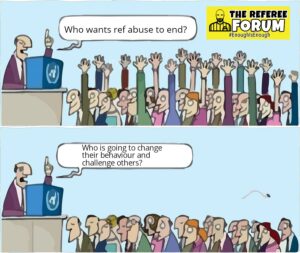
3. Why the unprecedented levels of aggression towards Referees? [4:58]
Patrick Skene
I want to take you through some examples. Northumberland one of the largest leagues in Europe. Their referees have gone on strike over the level of abuse.
There’s a referee strike in Dublin schoolboys and schoolgirls in Ireland. All games canceled because of constant abuse and threatening behavior of managers, players, coaches supporters.
In the USA the Young Sportsman Soccer League is having silent weekends because of referee abuse.
There’s a Christian league suspended because of too many abuse reports.
The Northeast Combination Football League last month forced to put a ‘Blackout’ for referees on – no match officials appointed and they have to find their own because of the abuse.
It’s not just England, it’s all over.
Ant Canavan
Yeah. It’s a global shift and it’s evident in politics as well. The way that people are now thinking more of themselves and rather than what’s for the greater good – I have to make a little self-sacrifice in order for greater good and people seem to forget that.
Maybe COVID has something to do with or maybe there is another, outlying influence that is making this shift towards people thinking more of themselves than of the community.
But it definitely manifests itself in aggression and physical threats and threats of violence on the football pitch. I’m not gonna lie, it can be scary sometimes.
I’m a big lad. I know how to look after myself and work in the security industry. So I know how to defuse situations without the need for violence. Even with all those tools in my toolbox, sometimes I do think the worst that could possibly happen to me in this football match is that I don’t come home at the end of it.
I end up going off to hospital because I’ve been assaulted, and actual bodily harm has happened to me.
The instances of experiencing abuse and aggression myself are few and far between. But I’m in so many WhatsApp groups or on Twitter, Facebook and Instagram where people reach out to say: ‘This has happened to me today.’
They shouldn’t be asking me, they should have a support framework given to them by the national body, by their local regional body, whomever. It shouldn’t come down to an independent resource that’s done voluntarily on the internet to look after referees or advise them on what’s the best thing to do.

4. Why do we allow it? [7:21]
Patrick Skene
One post that stayed with me on your feed was from Tom Boardman that read. “I think the time has come for me to consider a break away from refereeing. I went to bed and woke up thinking about the abuse received. Football can’t be saved from itself. It turns people into animals.”
Why are those green beautiful green fields in Australia, England, America the last permissible bastion where you can verbally abuse, disturb the peace and abuse someone – a child or an adult?
Why is that?
Why do we allow that?
Ant Canavan
The people that could fix this are also the people who have a revenue stream from the abuse.
So say your referee gets abused by a parent on the sideline. So you put in a misconduct report to your County FA. And the county FA sends this to the club this misconduct charge saying this has happened how would you plead is it either guilty or not guilty?
Most clubs can’t be bothered going through a tribunal or a hearing or anything like that. So they’ll say: ‘okay, it did happen. We are guilty and we’re sorry.’ And with that will come a fine and a warning against that future conduct.
Now, if you multiply that process by the amount of refereeing abuse that goes on out there, say each fine is 50 pounds. Well, 10 instances of abuse – you’ve raised 500 pounds. 100 – you’ve raised more and so on.
You look at the cash that these County FA’s have in their banks. It’s not pocket change. It’s not like they’re operating a not-for-profit. Some of them have got a million pound in the bank.
And what I would love to see is for them to use that money to put back into looking after the referees, seeing as that seems to be the primary source of their revenue generation. You look after your referees.
The FA have just come out with a new respect advert, it’s very high production value. I know a couple of the referees that are in the video and they’ve done a fantastic job in terms of presenting themselves as professional looking referees, but it’s a completely ineffective tool in stopping abuse, in curbing this aggression that is rife.
It’s like a cancer in football right now and it’s spreading fast. Because there’s no incentive for the FA to stop the status quo because they’re making so much money from it.
5. What happens when a sport allows mobbing of officials? [9:53]
Patrick Skene
We all know that the fish rots from the head and the role modeling comes straight down from the professionals and the coaches’ abusing referees on TV. It’s not good when players at the top, show total disregard for officials and if that was ever in doubt, the abuse we heard when the stadiums were empty for COVID was a real eye-opener.
What other sport allows abuse and mobbing of officials?
Why aren’t the FA cracking down at least at that top level where terrifying normalization that comes from the role models behaviour?
Ant Canavan
Again, it comes down to money. It’s fair to say the Premier League is the best league in the world. And you’ve got your best players the likes of Cristiano Ronaldo, who are guilty of this.
If he doesn’t get his own way, he will throw a tantrum. He’ll throw the ball away or stomp his feet or he’ll shout and scream and all the sort of stuff that you expect from a toddler.
The referee should be dealing with that as dissent. The yellow card should come out. And if he does it more than once in a match, which he does often, he gets the red card and he misses the next game.
Now the people that put the money into the Premier League want to see the likes of Ronaldo play every single week. The referees at that level are brilliant and they’re there for a reason.
They are the top referees. They’ve come through the system. They’ve proven their ability. But when they get to the top level, when they get to the Premier League, they become entertainment facilitators.
And people want the entertainment of 11 versus 11 players. And as much as we say that it’s horrible for the referee to receive dissent, abuse and screaming in the face, actually, it’s a form of entertainment. It goes back to the days of the gladiators in the Coliseum.
People say ‘Yes I want to see more. I want to see more aggression.’ It’s entertainment at the top level.
What we need to do is say – look, we do have two tiers of football now, and thanks to things like VAR and electronic communications, you’ve got this elite level of refereeing where you’ve got all the tools, all the care, all the bells, all the whistles to facilitate an entertainment spectacle.
But down at the lower levels, at the grassroots, outside of the professional football pyramid, we don’t have the same tools. We’ve got inexperienced referees, we’ve got unfit referees, we’ve got referees that aren’t up to date with the latest Laws of the Game.
But the people that play the sport expect the same standard of officiating as they see in the Premier League where they’ve got a referee, two assistants, a fourth official, a VAR operator an Assistant VAR operator, you’ve got reserve assistant referee.
So you’ve got a whole team on the Premier League. They expect the same standard of decision-making from one bloke who could be having a midlife crisis. He’s got a bit of a belly, he hasn’t read the rules for about five years.
The expectations of the standards of the referee at both levels are the same and there’s frustration and the aggression comes about when the referee doesn’t perform at the same level.
I think that’s something that, we go back to referees are human, they’ll make mistakes, but not as many mistakes as the players during the game. And yet the standards and expectations of that referee are that very, very few mistakes are made.
In fact the fewest on the pitch if not perfection is expected.

6. Is abuse a part of the role? [13:13]
Patrick Skene
So we end up with a sad reality that many referees have been trained by what they’re seeing on TV to think that abuse is part of their role.
Ant Canavan
Yeah, there’s no getting around that – the best footballers want to play like Ronaldo. The best referees want to officiate like Michael Oliver or Martin Atkinson, the top referees you see week in, week out.
But there’s such a gulf between the two. You know, your Sunday League footballer isn’t going to play like Ronaldo and your Sunday League referee isn’t going to referee like Martin Atkinson.
Patrick Skene
Do you remember when the FA introduced zero tolerance on abusive language to referees that lasted about two weeks and they scrapped it?
Ant Canavan
They scrapped it because everyone’s saying, there’s far too many cards going in. Games are getting abandoned because people are getting sent off.
And yes, that is what needs to happen to shift it back to being an enjoyable sport and hobby but people seem to be using football, Sunday league, grassroots football, youth football as an outlet for all the frustrations that they seem to be feeling in their life outside of football.
They bottle it all up and release it into that environment and yet the FA do need to be harsher. They need to. We talk about revenue generation. It’s crazy to think that they don’t just go: ‘Right everyone, the fines are going up. The bans are going up. I want to see more cards.’
They introduced the Sin Bin here in England. I don’t know if they’ve got it over there in Australia. Whereas you get a caution for dissent. And it comes with a 10-minute sin bin. So if you throw the ball away in disgust at a decision or you get in the ref’s face and scream that you’re not happy you got cautioned for dissent that also comes with 10 minutes off the field of play.
Now, that yellow card doesn’t get put in as a misconduct report. It just kind of stays within the game. So if it’s just one yellow card, it gets forgotten about. Now the FA said in the first season that this got brought in, player dissent was reduced by 38%.
But actually, that’s not accurate, that’s kind of fudging the figures because what happened is the yellow cards for dissent that used to get put in without the sin bin stopped getting put in so there was less cards reported
I remember I used to referee in the Welsh system. And there was a time where, if you gave a free-kick and there was dissent, you would just move the ball forward 10 yards for each piece of dissent that you get, to a point where you could give a free kick in the defensive half and end up being 18 yards out.
Again, this was an effective way of practically dealing with dissent during the game. But in terms of actually reducing the amount of dissent or the amount of aggression that referees receive, they’ve not really been effective.
The level of dissent and the level of aggression and abuse has in fact, I think, gone up especially markedly in the last two seasons.
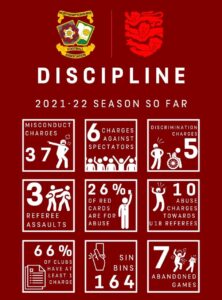
7. The devastating impact of TV commentary on normalising referee abuse [16:34]
Patrick Skene
I want to raise the role of television commentators unfairly criticizing referees and then creating this army of armchair Sky Channel fans who, basically think referees are fair game to be abused.
Ant Canavan
It would help if sports pundits actually knew the Laws of the Game.
The amount of times I hear them offering a bit of punditry, where they’re just plain wrong, it’s infuriating. And you’ll see when it happens on Twitter and on Facebook, on Instagram. ‘I’ve just heard a commentator say this’, ‘they need to know the laws of the game’, ‘they shouldn’t be in that position’.
Because what they are in fact doing is like fake news as they are passing on this wrong information.
Recently, Kasper Schmeichel got his hand on top of the ball and it got kicked out from underneath him and a goal was scored. The referee disallowed it because the goalkeeper was deemed to be in control of the ball by having his hand on top of it and it being on the floor
They went to VAR and by the laws of the game, the referee made the correct decision. The pundits before, during and after that decision-making process as it went to VAR were absolutely clueless.
It was as if they were commentating on a sport that they’d never watched before. They were confused. They were angry that a goal had potentially been ruled out.
But as soon as I’d seen that, it’s difficult to see in real-time, but as soon as you see it slowed down and that’s what VAR is for, you very quickly come to the correct decision if you know the laws of the game.
Football is this weird sporting phenomenon where it’s played by so many people but you ask them, if you gave them a quiz or a test on the Laws of the Game, 90 plus percent would not pass a referees course, a basic referees course of the Laws of the Game.
And it’s weird to have pundits in that position being in that kind of group of ignorance whereby on the television they pass it over to Peter Walton (former Premier League Referee) and they say, ‘Oh, we’re not sure about this foul. We’d have given a penalty. Peter Walton, what do you think?’
And Peter Walton would come in, often backing up the referee and their decision, and also quoting the Laws of the Game. You’ve got him doing that.
Then you’ve got backlash against him now telling people what the Laws of the Game actually are, saying things like: ‘Why are we going to Peter Walton, he’s just going to back the referee up?’
Yes – because these are referees! We know the laws of the game. We know what the correct outcome is. We know why and what the decision process to get there is.
It’s like you’ve got the scapegoat of the referee on the field and now you’ve got the scapegoat of the referee in the pundits’ box as well.
So these pundits can just have a go at him for being a referee and giving a decision they don’t like as well.
Patrick Skene
It’s unbelievable that it’s the same as our sports in Australia where the commentators have a huge role. They focus on one mistake as a pivotal turning point in the game rather than the 1000s of mistakes made by players every week.
Ant Canavan
Yeah, it’s a self-perpetuating mechanism and the only thing that’ll stop that cycle is one of the hard parts one of the components being removed.
So if it is the FA or the Premier League, or whoever the broadcasters are in that particular sport, stopping, they need to physically ban the discussion of a referee, or criticism of a decision especially when they have pundits that don’t know the laws of the game.
If one of those components was changed or altered, it would massively affect the rest of the cycle as it goes around.
What is the answer because the top tier of football is more about entertainment than it is about the pure sport.
That’s why we’ve got a lot of people now switching off from Premier League and then going back to their local clubs in their local area and supporting the grassroots teams. Non-league football teams are seeing a massive surge in attendances because people are getting disillusioned with watching what they see now as a glitzy, glamorous Premier League that they have very little interest in.
They’ve been priced out by things like sports channels, subscription packages and match day gate fees are huge.
You can get into a local club for two or three pounds, but to go the Premier League you’re looking at 30,40, 50 pounds, so it’s a big markup to watch those top league Premier League games live.
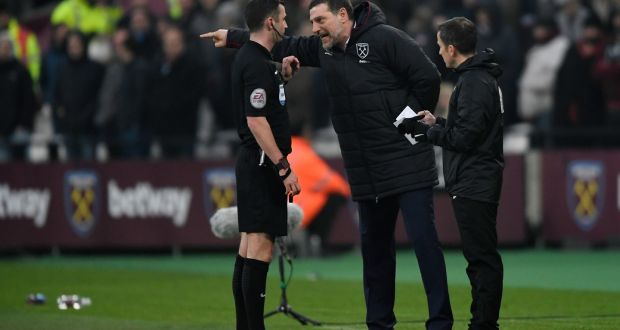
8. Child referee abuse [21:11]
Patrick Skene
Probably the biggest issue I have in this space is child referee abuse.
In the torrent of abuse that you highlight on your social media feed one stood out for me from a top of the table Under 12’s game and I’ll read it out:
“A parent ran on in my face threatening me. A manager threw a flag at me. Another parent said he’d smash my face and wait for me in the carpark.”
“The referee was young and had to endure threats as ‘I’m going to burn you alive.”
When will the football authorities combat this massive disgrace to the game?
Another one reported an adult coach making a 14-year-old female referee cry at an Under 11 game.
When child referees are abused by adults, it’s a toxic cancer and why isn’t it called out for the cowardice it is?
Because it continues this cycle that the only place that it’s permissible in society to scream at kids is at a football game.
Ant Canavan
There you have it. Why do we allow it and something that popped up either this morning or late last night was from someone else? I think it was an account called refnecks or something similar.
They said it’s child abuse, it’s criminal.
Why are the police not involved?
The answer is because no one wants to press charges.
No one wants to be especially if you’re a 14,15, 16-year-old referee and you’re refereeing the 10-year-olds, 12-year-olds and you receive abuse, vile abuse like you’ve just quoted there.
You’re threatening a child. You’re threatening a child to burn them alive. That’s criminal.
But in turn, you know as a referee, you’re put in at that age and you don’t have a lot of confidence. You got more confidence than a lot of those adults that are throwing out those insults who would never step into the middle of a pitch and be a referee themselves.
So they’ve already got more confidence than them but in terms of confidence in yourself and going to the police, what’s the protocol?
How do you proceed with that?
I think in those instances they need a lot of support, and they need a lot of help from what I like to refer to as “Last Week’s Ref” as well.
So if you’re refereeing a game and you receive that abuse, there are a lot of referees that just take it and go, well it’s part of the game.
You have to expect a little bit, you have to have a thick skin and that is not true at all.
And what you have to think of is okay, me as six-foot Ant Canavan, 100 kilos, mostly muscle, a little bit of flabby bits around the belly, but we’ll ignore that.
I have got the thick skin and I can handle what we’d call the higher levels of dissent. I wouldn’t accept the abuse and I would report it up to the County.
There are referees out there who, a little bit more timid, who would just take the abuse, not show cards and therefore not report it. And then the players that have given the abuse think: ‘Well, I gave it to last week’s ref I can give it to next week’s ref.’
Until we’ve got more referees that say no, if you abuse a referee, you’re getting reports – you are going to get fined and you are going to get banned.
The clubs need to take a little bit of responsibility as well. If you’ve got a player or parents that are throwing that sort of abuse at a referee, you need to say: ‘Look – as good at football as you may be, we don’t want to give our club a bad reputation by threatening children.
And if these kids do go to the police with the full support of their County FA or their local referees’ Association, then a big song and dance should be made about it.
Not what currently happens which is a misconduct report is submitted to the County FA and then the rest of the process takes place behind closed doors including any sort of notification of punishment.
It needs the stronger referees now to step up at grassroots and start saying: ‘I’m not going to take this anymore. I’ve got to think of the kids that are just coming into the game.’
Would I allow my 14-year-old son or daughter to receive this sort of abuse?
If the answer is no, then you also need to not take that abuse and just let it roll off you as part of the game because it’s not acceptable.
I’m lucky enough in my position in Merseyside to work with two Premier League clubs, Liverpool and Everton and I get to referee at their academies fairly regularly.
And I receive absolutely zero abuse and it’s because the parents know if they do anything that would jeopardize the place of their child playing football for those two Premier League clubs, then they’re having a proper detrimental effect on that child.
The same thing needs to happen at grassroots outside of these academies.
If your parents are throwing vile abuse to the referee, if they’re threatening physically or verbally a referee, then the club’s needs to say: ‘I’m sorry, but we don’t want your child in our club if that’s your behaviour as parents.’
One option is to try and curb the behavior by getting the parents to sign a code of conduct. But they’re absolutely meaningless, because there’s no enforcement taken if the code of conduct is breached.
What we really need is action, actual real action to change the game and not lip service, not fancy adverts.
Something that will physically alter the game because I mean the lad that got threatened to be burnt alive. That was only the weekend just gone.
I received that via WhatsApp and I was like: ‘This is disgusting’.
And to be fair, the referee’s association here have a welfare team. As soon as they spotted that on my feed they jumped in and said: ‘Pass on our details please, we will look after this referee and give them all the support they need.’
Because they understand they don’t want referees to drop out at this point of their safe refereeing career because it can go on decades. But don’t let these idiots at this level ruin it for you.
Because refereeing can be very enjoyable. You can get to go to some amazing places. I’ve traveled the world refereeing. I’ve refereed international teams. I’ve had some amazing times, I’ve been to some amazing stadiums, met some amazing people.
You can do that as a referee but not if in the first 5-10 games in your first season or first couple of seasons, you get abused and think: ‘I do not want any part of this if this is what football is about. I don’t want to do it for a decade or two. I don’t want to do it at all’.
And that’s why you’ve seen people drop out.
We need a cultural shift back to mutual respect on both sides.
Respect the referee, because a referee will never go out onto that field of play to abuse anyone and to the players that say: ‘The ref needs to respect me – show me respect first.’
No! You start off on a level footing, with mutual respect. That’s what it’s about.
It’s an understanding that you play your football, I’ll referee the game. You’re going to do your best to score the goals. I’m gonna do my best to get all the decisions in between correct.
We’re all out there doing our best and if mistakes are made so be it. I won’t criticize you for missing an open goal from two yards away.
So don’t criticize me for missing an offside when I wasn’t in a good position.
That’s the sort of attitude that needs to come forward.

9. Referee mental health [28:08]
Patrick Skene
I want to explore one of your earlier points about if the parent mucks up you get rid of the child as well – They come as a package.
In Australia there is a philosophy: ‘don’t visit the sins of the of the parent on the child’.
Which stimulates the debate – ‘Is football a right or a privilege?’
And I think we’ve got to move it from a right to a privilege.
It used to be a right in the old days. But I think now it should be a privilege like attending any club or any institution. You can’t go down your local gymnasium and start abusing people that you’re a member of.
It’s sad that the kid will be collateral damage but I just don’t think the parent has the right to, bring on the onset of potential mental health issues in a lot of these referees as well.
When I’m reading your feed, I’m thinking to myself, what we’re seeing here is people having to stop refereeing because they’re sleeping on it and having nightmares about it and worried about their safety.
Why isn’t this framed as a mental health problem?
Ant Canavan
We’re treating the symptom, not the cause, because the FA have just said: ‘Great news, everyone. We’ve just trained up 50 mental health champions. So, if you’re having mental health issues, you can come and talk to one of these’.
Okay, let’s actually say what’s causing these mental health issues in the first place and target them. There’ll always be mental health issues that will come about regardless.
We could be the world’s most respectful football league and you’re doing your best and you’re not receiving abuse, you’re having a great time but there’ll still be something else that will affect your mental health.
That’s just the nature of what mental health is.
So, I’m not criticizing the fact that we have mental health champions. It’s a good thing.
But the fact that we’re just throwing out mental health champions as a solution to referees that are receiving abuse.
No, no, no. Let’s just stop the abuse then we won’t need so many mental health champions.
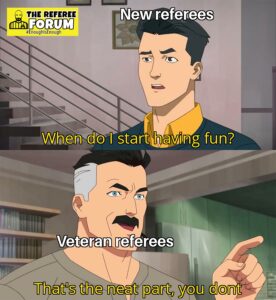
10. Social media abuse [29:55]
Patrick Skene
I’ve got to bring up the elephant in the room. It’s social media – a place you’re a colossus and old referees didn’t have to deal with social media and sniping.
Today the referee abuse just doesn’t happen on the field, you go home and get a second dose of it online.
Even at international level, or FA level, EPL level, even if the officials get it correct, and the Twitter army will jump on. They don’t have any idea of the laws and it gets personal and through one-upmanship, end up increasing their abuse levels for referees.
We can control what happens on the pitch with crackdowns on behavior.
What can be done about referee abuse on social media?
Ant Canavan
It needs to come from the social media companies, it’s their platform. We’re quite far down in the pecking order in terms of referee abuse, because before that, you’ve got things like racism, you’ve got political death threats, and then eventually as you go through all the hate, all of the abusive tweets, eventually you will get down to the personal insults on referees.
That’s the sort of level that we’re at.
But in terms of a platform, Twitter is toxic, it’s horrible.
And because of the anonymity it provides, people can and will say anything that they want and there’s no repercussions or there wasn’t until recently, repercussions for them doing that.
So, people that would throw out monkey emojis to a black footballer, if they’ve had a bad performance, it’s vile, it’s disgusting, but people do it and get away with it.
And so, because they’ve got away with it, that kind of reinforces you’ve not done anything wrong. No one’s found out, do it again. What’s the worst that could happen? Nothing.
I’m very open and transparent about who operates ‘The Referee Forum’. I will call out dickish behavior when I see it and that methodology has gotten me into trouble with my Football Association.
Abuse on social media is not something that the FA should concern themselves with. It is something that if it’s criminal, the police should deal with it.
But in terms of the platform itself, you know, get rid of the anonymity and 99% of the abusive tweets would stop.
Patrick Skene
I like the way you call out people blaming the referees for their losses.
One of your memes says: ‘Make sure to blame the referee to hide your own deficiencies as a coach and it’s always the referee’s fault when you lose.’
Or another: ‘I don’t tell the players how crap they are when they frequently miss sitters.”
It’s amazing that referees can make one mistake and be lambasted for having a bad game but the players are making constant mistakes.
Ant Canavan
Humour is the way I deal with it. I have a background in entertainment and I was managing a comedy club before COVID hit, so my way of dealing with a lot of these is with humour.
And so I make a lot of memes which is probably why the social pages are so popular. If you want to get a message out there now. Don’t make a fancy video. Don’t write a long statement.
Throw it on a meme, put a funny picture on it and people will pay more attention to that than they would for the multimillion-pound advert that you’re trying to release with a similar message.
We’ve got to a laugh in a kind of gallows humour way because bear in mind in England, we’ve gone from 30,000 referees a couple of seasons ago pre COVID to about 21,000 referees now.
So almost a third of all of our referees have gone: ‘Do you know what? I’m really not enjoying it enough to want to come back and officiate anymore.’
So we’ve had a huge dropout.
If we can’t laugh at this situation that we’re in, then the only alternative is to cry and then even then we’d need more mental health champions and I don’t think there’s enough in the world to deal with that.
So at the moment on TheRefereeForum.com I throw out loads of memes. If anyone wants to go check them out. They can do it there.
But there’s also some good campaigns as well.
Using the meme format, I asked people to send me photos of themselves refereeing in their kit, because we’re proud as referees.
We love what we do.
We love football just as much as any player as any fan or anyone like that and we love being part of the game. I think people forget that sometimes.
People think: ‘The referee wants to ruin the game.’
No! We want to enjoy the game and we do enjoy the game most of the time. If I can raise awareness or make people think about their actions with memes or with funny quips, or with calling out troll behavior very directly sometimes.
It’s gotten me into trouble it with my methodology sometimes, but I’m prepared to take the slings and arrows to change people’s behaviour.
And some people you’ll never change and they’ll always be that way and they’re the ones we need to remove from football. They need to be cut out like a cancer, but there’s people that will listen, they will be educated and they will see a side that is mutually beneficial for everyone.
The more referees that we have, the bigger the talent pool, the more cream will rise to the top and the better our officials will be in five and 10 years time.
But the fewer referees that we have, because they’re dropping out because of the abuse, because of the offensive insults, then we’ve got a smaller talent pool.
Referees will fail to progress. Burnout is a thing
In October, I was probably doing anywhere between 6 to 10 games a week, just because there’s a massive shortage of referees. And I’m fit enough to get out there to run around that much so I’ll do it.
But you can’t do that for a whole season.
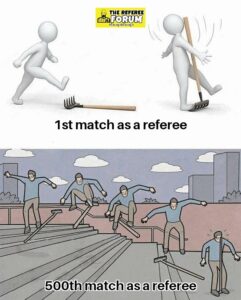
11. Should police be involved in policing abuse in football matches? [35:56]
Patrick Skene
One solution I’ve heard is to just go to the next level and have the police at every game. Cowards tend to respond and shrivel up when actual police are around and it increases accountability. Because making an incident a police matter (after the fact) – It seems too late because it’s already happened. Local councils funding and putting police at games to walk around as a deterrent. What do you think about that?
Ant Canavan
They do that in America and they still have the issues. Youth soccer in the United States is a goldmine for viral videos.
Game will be abandoned, the game’s over. Then the parents will come onto the pitch they’ll all have a fight with each other and then they’ll get separated by the police.
These tournaments have on site police for the duration because they expect that sort of behaviour from the parents or from the coaches maybe from the players. So having police present, I don’t think it would change anything.
Unless we’re prepared to admit that there is a problem. As soon as we say yes, there’s a problem and the people that are doing it need to be dealt with and removed from the game or probably removed from children if we’re being honest.
If they can’t control themselves enough to not offer death threats to a 14-year-old referee, they shouldn’t be around children anywhere.
Would the police being present change anything?
It would stop a few people, but it wouldn’t stop the problem.
Patrick Skene
What about putting GoPro cameras on referees so we can find out what they’re going through and bring some accountability that way?
Ant Canavan
We know what the referees are going through.
Do we really need video evidence of it as well?
It might help. All it will do is produce more content for me on social media, which is fantastic because that’s what I want.
The more videos and stuff that I put out, the more the page grows and the wider the audience.
But at the same time, let’s be honest, we know what the problem is. If a referee says that that person has said x y and z. Okay, there might be a few referees that embellish but for the most part, no referees are lying and making that up, because they don’t need to.
The level of vitriol and abuse out there doesn’t need to be embellished. It’s horrendous already.
Having GoPros, having body cams or anything like that. What would it change?
Would people not behave that way because they’d be caught on camera.
Let’s have a look at other roles that use body cameras in their job; traffic wardens, police or security people that work in pubs that are a little bit dodgy.
All of those people wear body cameras to capture the behavior that they have to deal with. It doesn’t change the behavior.
If you’re gonna abuse a traffic warden, if you’re gonna abuse security, if you’re gonna abuse anyone who’s wearing a body camera as part of their role. You’re going to do it whether they’re wearing a body camera or not.
And at the moment, there’s enough people out there who are abusing and the referees will put in a report to say: ‘I’ve been abused. This has happened, that has happened.’
It’s then down to the FA to follow that misconduct charge and offer a punishment. Video evidence really doesn’t change that process.
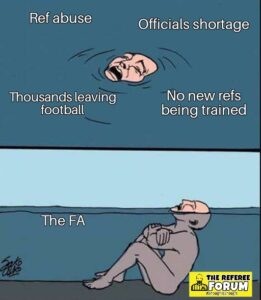
12. What works to combat referee abuse? [39:10]
Patrick Skene
I’d like to end on a positive note. You’ve got some good examples. What works, what you’ve seen work.
I see the Liverpool Old Boys featuring quite frequently on your feed.
What are some things that you’ve seen work and what are some programs that we can look to as having got it right?
Ant Canavan
The Liverpool Old Boys League here in Merseyside is a fantastic example.
There’s a lad called Greg and he is absolutely smashing it. Before the season even started, he went:
‘Right. We’re sick of the kind of behavior of certain elements of the team, certain teams, and certain spectators of those teams. So, if you’re going to play in our league, here are the rules that you have to abide by,’
‘And we are going to monitor this, and we are going to take punitive action if this Code of Conduct isn’t adhered to.’
And they did it and they actually punished people, the offenders very quickly.
Very, very quickly the teams realized, if we don’t conform, we don’t get to play football. And as much as they wanted to win every game, their behavior, because of this hardline approach did change.
There was a meeting at the start of the season where all of the referee’s representatives from the clubs – the managers, the coaches, all got together and the framework of the league was laid out – this is acceptable, this is not acceptable.
And here’s the process that we are going to take in order to make sure that this is done. There was agreement at that point everyone was in the same room.
No one could say: ‘Well, I didn’t know I didn’t sign up to this.’
And from a league perspective, this is the right way to go about things.
I’m in a WhatsApp group for that particular League and the engagement from the referees is great. If there’s any problems, it goes into the WhatsApp group straight away.
And then obviously in real-time, there is support for that referee.
That referee needs assistance in writing a report for misconduct to submit to the County FA in order for the correct punishment to be done.
They’ll do it, they’ll back the referee all the way.
Whereas some leagues are quite happy for the clubs to hold all the power because every club that is registered with the league is money for the league.
And they’re quite happy to say: ‘well clubs you behave how you want to abuse referees, they’ve got red and yellow cards, they can sort it out themselves. You just keep paying your subscription to the league and we’ll just let you keep playing football regardless of what goes on.’
And Liverpool Old Boys have said: ‘You know what? We don’t want teams that will have a negative reputation on our league.’
The perception of the referees in that league is that it’s a marked improvement on what it has been and I hold them up as a beacon.
There’s two entities at the moment that I say- ‘Look at these two groups. This is how it should be done!’
As a league – it’s Liverpool Old Boys.
And as a county FA – it’s North Riding Football Association.
They look after their youth referees, their programs and what they have in place to bring referees into and through the system and progress them as well, is phenomenal.
I wish every county was like North Riding Football Association. And I wish every league was like Liverpool Old Boys.
And I encourage anybody that listens to this to go on Twitter and look up those two and just follow them, follow the work that they do, and take their example as best practice.
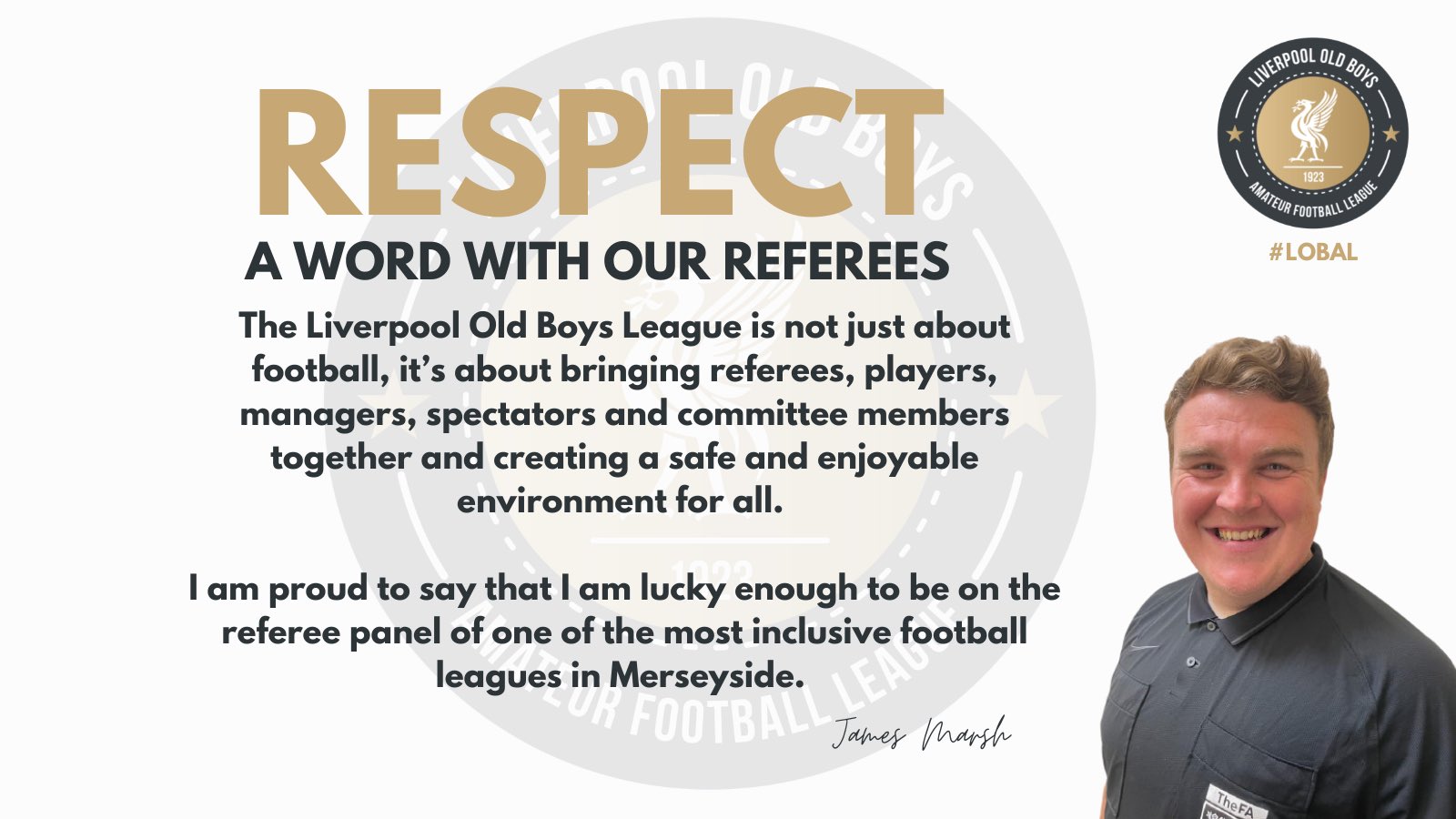
13. #RefPositivity [42:34]
Patrick Skene
And finally, you have a hashtag called #RefPositivity. It’s shame that it needs its own hashtag.
Ant Canavan
Yeah, it’s a shame I don’t get to use it more often.
But, but in terms of awareness and positive kind of attitude towards referees, whenever I spot a club that have enjoyed a referees performance I like to retweet that under the hashtag #RefPositivity.
And if anyone listens to this and you do have a good referee, it’s important to acknowledge that as well because referees do get good enjoyment from the game and we know when we’ve had a good game.
In the same way we know when we’ve had a bad game.
But it’s nice to get praise from the teams, from the players and the coaches that you referee as well. Sometimes it happens on the field of play at the end of the game where you’re shaking hand hands and ‘nice one ref that was that was a really good game’.
And you say back: ‘Thanks very much It was good game to referee’ that’s good.
But to see it on social media is nice, where most people only seem to jump on to leave a mean tweet, a negative tweet to abuse someone over a performance.
The online negativity is especially bad when it comes from official club accounts.
That really sickens me because it’s basically the club saying: ‘We’ve abused the referee on the pitch for 90 minutes but that wasn’t enough. So we’re going to use our official online presence to abuse them after the game has finished as well.’
No referee would ever jump on Twitter and say a striker was crap for missing an open goal or a centre-back should have made a tackle that led to their opponent scoring if only they were a little bit better.
You know that this is a very polite tweet and by the way, not one swear word in that – you can tell I’m a ref but it’s not vile, it’s not horrible. It’s not hateful.
And no referee would ever jump on there to do that to a player or a coach or a manager but very, very quickly it seems they – players, coaches managers seem to want to get on social media and it’s a deflection.
We go back to what it was, it’s a deflection from their own deficiencies.
If you are good enough to win a football match, you don’t need the referee on your side so to speak. The referee is impartial, he’s not giving anything one way or the other.
He or she is out there giving their best possible performance, calling it straight down the middle. If you didn’t win and you thought you should have done, have a look at your own players, have a look at your own tactics before having a look at the referee because the referee really didn’t influence the game that much.
14. How to find Ant Canavan and The Referee Forum? [44:51]
Patrick Skene
Before we sign off, how can people find you?
Ant Canavan
There’s the therefereeforum.com We are sponsored by backztitch.com which is also my wife’s business she’s a clothing fabricator. We do custom clothes and loads of referee designs on there. Get yourself one of those T-shirts, hoodies, hats, all that sort of stuff.
- Facebook: TheRefereeForum
- Instagram: therefereeforum
- Twitter: TheRefereeForum
And I am on all of those as well.
If you want to follow me It’s Ant Canavan on all of those platforms as well.
Patrick Skene
Well, I want to say congratulations you’re doing heroic work. A voice for the voiceless in many ways and you’re up there giving a muscular presence to referees. Thanks for your time and keep up the great work.
Ant Canavan
Thanks Pat and hopefully we can come back revisit this in may be the end of the season or next year and see how things have changed.
Join the Club Respect mailing list
Articles by Patrick Skene
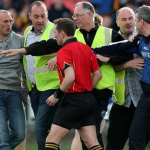
Sport’s ugly blind spot – abuse of officials

Tales from the frontline tackling the abuse of officials – Football (Soccer)

Patrick is a founder of Cultural Pulse, a leading micro-community marketing and engagement agency that has worked for the past 15 years on sports participation and fan engagement programs for over 100 communities. His recent book ‘The Big O, The Life & Times of Olsen Filipaina‘ has gone into reprint and his stories on the intersection of sport, history and culture have been published by The Guardian Australia, the Age, the Sydney Morning Herald and Inside Sport. He is currently the proud coach of the Rockdale Raiders Under 8B1’s.
Contact Patrick on twitter or LinkedIn